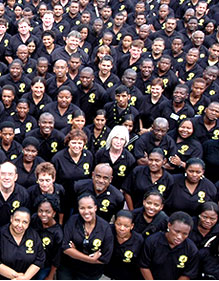|
Getting your Trinity Audio player ready...
|
 Dear Corruption Watch,
Dear Corruption Watch,
The Special Investigating Unit probe into expenditure around Nkandla has finally been submitted to President Zuma, after a delay. How do we ensure the president co-operates with the very probe he ordered and implements its recommendations?
Yours faithfully,
Seeking Improved Understanding
Dear Seeking,
There are two important things to remember about the Special Investigating Unit (SIU). First, the SIU is appointed by the president. The Special Investigating Units and Special Tribunals Act regulates the appointment, composition and functions of the SIU. It allows the president to establish multiple special investigating units to investigate allegations relating to maladministration, unlawful conduct by state employees, corruption, unlawful expenditure of public money and other related wrongdoing. The Act envisages that the president can establish an SIU ad hoc to deal with a specific allegation of wrongdoing. However, he can also establish a permanent special investigating unit to which he can refer particular allegations. This is what he has done; the SIU we know is a permanent investigative body.
However, the president still controls the work of the SIU because it is up to him to refer particular matters to the SIU for investigation; such as the Nkandla affair. This distinguishes the SIU from, for example, the public protector who acts on complaints from any person, or can even act on her own initiative. The SIU is, in effect, a tool of the president.
Second, the SIU is an investigative body. It is not part of the South African Police Service or of the National Prosecution Authority (NPA) and its role is not to prevent crime or prosecute or punish wrongdoing. Its role is to investigate.
It has wide powers to pursue those investigations, including the power (after obtaining a warrant) to enter premises, search them and seize any evidence it finds there, and the power to demand that people appear before it and answer questions, on pain of criminal sanction.
If its investigations uncover wrongdoing, the SIU has a variety of options. It can institute civil proceedings against any person to recover money owed to the state. In the case of Nkandla, the SIU has instituted civil proceedings against Minenhle Makhanya, President Zuma’s architect. The SIU claims that Makhanya wasted R155-million of public money by authorising features not recommended by the official security assessment, including landscaping, air conditioning, escape tunnels and lifts.
The SIU can also submit interim reports to the president, and must submit a final report to the president. As the SIU is established by the president and investigates only the matters referred to it, it makes sense that it must report to him. It is not clear whether the report can also include recommendations on actions the president should take. Importantly, there is no requirement (unlike with a report of the public protector) that the SIU’s report must be released to the public. Unless the president chooses to release the report, it will be impossible to hold him to it.
Lastly, the SIU can refer evidence which indicates that a crime was committed to the prosecuting service. The SIU has no power to arrest people, or charge them with crimes; its only power is to refer suspected criminal activity to be prosecuted.
In theory, the SIU could refer the president to the NPA if its investigation into Nkandla uncovered criminal wrongdoing. If the SIU made findings or recommendations in its report, we could also expect the president to either comply with those recommendations, or provide some rational reason for not doing so. However, there is no legal obligation on the president to implement or abide by findings of the SIU.
• This article was first published in Sunday Times: Business Times




